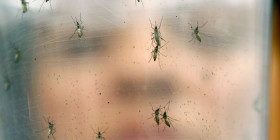Kerala’s Kozhikode district has been affected by the deadly Nipah virus that has claimed six lives, according to Kozhikode district collector, while eight others have been kept under strict observation. The World Health Organization has reportedly said that there is no vaccine available to fight the virus, however, the Central government assured full support to the Kerala government.
“We are closely monitoring the situation. I have also dispatched a Central team to assist the state government and initiate required steps,” Union Minister of Health and Family Welfare J P Nadda said in a statement from Geneva. In a tweet late on Sunday, Nadda said, “Reviewed the situation of deaths related to Nipah virus in Kerala with Secretary Health. I have directed Director NCDC to visit the district and initiate required steps as warranted by the protocol for the disease in consultation with state government.”
In view of the rising number of cases and reported deaths due to Nipah virus outbreak, Kerala Health Minister K K Shailaja on Monday said things are under control and there is no need to panic. “At the moment, eight patients are currently in treatment. Their samples have been sent to Pune and results are awaited,” said Shailaja.
A high-level team from the National Centre for Disease Control (NCDC) has already arrived in Kozhikode district to take stock of the situation. A district-level special task force, headed by Kozhikode District collector, U V Jose has been formed in the wake of the deaths due to this virus, official sources said.
The state has been put on high alert and two control rooms have also been opened in Kozhikode.
The state government has sanctioned an emergency fund of Rs 2 million (Rs 20 lakh) to the Kozhikode Medical College to tackle the present fever outbreak.
What is Nipah virus?
Nipah virus (NiV) infection is a newly emerging zoonosis that causes severe disease in both animals and humans. The natural host of the virus are fruit bats of the Pteropodidae Family, Pteropus genus.
Transmission of Nipah virus takes place through direct contact with infected bats, pigs, or from other NiV-infected people and people have been also cautioned that they should not consume fruits that have fallen on to the ground.
NiV infection in humans has a range of clinical presentations, from asymptomatic infection to acute respiratory syndrome and fatal encephalitis. NiV is also capable of causing disease in pigs and other domestic animals.
Nipah virus symptoms
According to Centers for Disease Control and Prevention, infection with Nipah virus is associated with encephalitis (inflammation of the brain). After exposure and an incubation period of 5 to 14 days,illness presents with 3-14 days of fever and headache, followed by drowsiness, disorientation and mental confusion. These signs and symptoms can progress to coma within 24-48 hours. Some patients have a respiratory illness during the early part of their infections, and half of the patients showing severe neurological signs showed also pulmonary signs.
Nipah virus treatment:
There is no particular vaccine available for Nipah virus, says WHO. NiV-infected patients are currently only limited to supportive care. Owing to the contagious nature of the infection, it’s extremely important to take standard infection control precautions.
Nipah virus outbreak:
While three members of a family at Perambara in Kozhikode died within weeks after what seemed to be common fever aggravated quickly, two more family members were being treated at the Medical College hospital and one of them has also tested positive.
Nine people have died in Kerala’s Calicut district due to high fever. The health department of the state confirmed that three out of the nine deceased were affected with Nipah virus.
The health department has, however, not confirmed the cause of the death of the other patients.
Earlier, three people reportedly died in Kozhikode district of Kerala due to Nipah virus.






Leave a reply